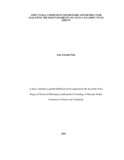Please use this identifier to cite or link to this item:
http://ir-library.mmust.ac.ke:8080/xmlui/handle/123456789/1335| Title: | STRUCTURAL COMPLEXITY FRAMEWORK AND METRICS FOR ANALYZING THE MAINTAINABILITY OF SASSY CASCADING STYLE SHEETS |
| Authors: | Ndia, John Gichuki |
| Keywords: | web domain,CSS preprocessors,CSS codes,Syntactically Awesome Style Sheets,CSS syntax. |
| Issue Date: | Nov-2019 |
| Publisher: | MMUST |
| Abstract: | One of the most popular languages in the web domain is Cascading Style Sheet (CSS). The language has evolved over time with the latest development being the introduction of CSS preprocessors which has made it possible to write CSS codes in a faster and efficient way. Therefore, the migration from CSS to CSS preprocessors by the frontend developers has been tremendous. There are several CSS preprocessors available in the industry with the Syntactically Awesome Style Sheets (SASS) becoming one of the most preferred preprocessors. This elevation of SASS is as a result of influence by its new syntax SCSS (Sassy Cascading Style Sheets) which is closer to CSS syntax. Although SCSS is very promising, it has inherent complexity which keeps increasing with time as a result of maintenance practices. The Entity-Attribute-Metric (EAM) model was used to describe the process followed to identify SCSS metrics while the Boehm model was used to identify the maintainability sub-characteristics. In addition, the Muketha’s structural attributes classification framework was extended so as to develop the SCSS structural attributes classification framework. The measurement of software complexity via software metrics for different software’s and software paradigms has continued to gain grounds over the years. There exists several structural CSS metrics but they cannot be directly applied to SCSS because SCSS has richer features than CSS. In addition, there is no existing framework that can be used to guide the definition of SCSS structural complexity metrics. To close the gaps identified, the researcher developed an SCSS complexity attributes classification framework which was validated through an expert opinion survey. This study proposed a suite of SCSS structural complexity metrics which were theoretically validated via Weyuker’s properties and Kaner framework. In addition, a tool was developed to automate the collection and computation of metric values. The data collected was analyzed through descriptive statistics (frequencies, mean and standard deviation) and inferential statistics (Spearman’s rho, ANOVA tests, and principle component analysis). Empirical studies by way of experimentation were conducted and all the proposed metrics strongly correlated with the three aspects of maintainability, namely, understandability, modifiability, and testability. Additionally, the metrics were found to be important for the measurement of SCSS complexity. The findings of this study show that all the proposed metrics can serve as maintainability predictors for SCSS. |
| URI: | http://r-library.mmust.ac.ke/123456789/1335 |
| Appears in Collections: | School of Computing and Informatics |
Files in This Item:
| File | Description | Size | Format | |
|---|---|---|---|---|
| John Ndia(PhD Thesis).pdf | 4.05 MB | Adobe PDF |  View/Open |
Items in DSpace are protected by copyright, with all rights reserved, unless otherwise indicated.
